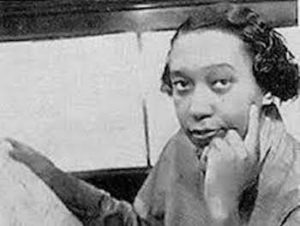
Julia A. Perry
*Julia Perry was born on this date in 1924. She was a Black classical composer and teacher.
Born in Lexington, Kentucky, Julia Amanda Perry studied voice, piano, and composition at the Westminster Choir College from 1943–48. There, she received her B.M. and M.M. She continued her graduate studies at Berkshire Music Center in Tanglewood and later studied at the Juilliard School of Music.
Around this time, she was awarded her first Guggenheim Fellowship. In 1952, Perry was awarded the Boulanger Grand Prix for her Viola Sonata. Soon after, she was awarded her second Guggenheim Fellowship, which she used to return to Italy and continue her studies. Perry also studied conducting at the Accademia Chigianain Siena during the summers of 1956 and 1957 and was sponsored by the U.S. Information Service to conduct a series of concerts in Europe in 1957.
After five and a half years in Europe, she returned to America, continued her composition work, taught at Florida Agricultural and Mechanical College in 1967, and was also a visiting artist at Atlanta College. Some of Perry's early compositions are heavily influenced by African American music. In 1951, Free at Last and I'm a Poor Li'l Orphan was published, showcasing her incorporation of the Black spiritual. She also composed Song of Our Savior for the Hampton Institute Choir, which used Dorian mode and a hummed ostinato with call and response phrases throughout the piece. In other words, Perry began branching out in her composition technique and experimenting with dissonance.
Other instrumental works by her include Requiem for Orchestra (also known as Homage to Vivaldi because of themes inspired by composer Antonio Vivaldi), several shorter orchestral works, several types of chamber music, a violin concerto, twelve symphonies, and two piano concertos. Her vocal works include a three-act opera and The Symplegades, based on the 17th-century Salem witchcraft panic. The opera took more than ten years to write. Perry's early compositions mainly focused on works written for voice; however, she gradually began to write more instrumental compositions later in life.
1960, the Manhattan Percussion Ensemble recorded Perry's Homunculus, C.F., for ten percussionists. The piece is scored for timpani, cymbals, snare drum, bass drum, wood blocks, xylophone, vibraphone, celesta, piano, and harp. Perry termed the work "pantonal" since it is neither in a significant nor minor key and uses all available tones. Perry uses the title Homunculus as a symbol for the experimental nature of the piece; the name refers to the test tube creature brought to life by Wagner, a character in Goethe's Faust.
Unfortunately, her works were not widely recorded. However, the New York Philharmonic performed and recorded Perry's Short Piece for Orchestra in 1965 in Lincoln Center, New York. In 1971, Perry suffered the first two strokes, leaving her hospitalized for several years. By that time, she had written twelve symphonies. She taught herself to write with her left hand to continue composing. During her life, Perry completed 12 symphonies, two concertos, three operas, and numerous smaller pieces. Julia Amanda Perry, who combined European classical and neo-classical training with her Black heritage, died in Akron, Ohio, on April 29, 1979.